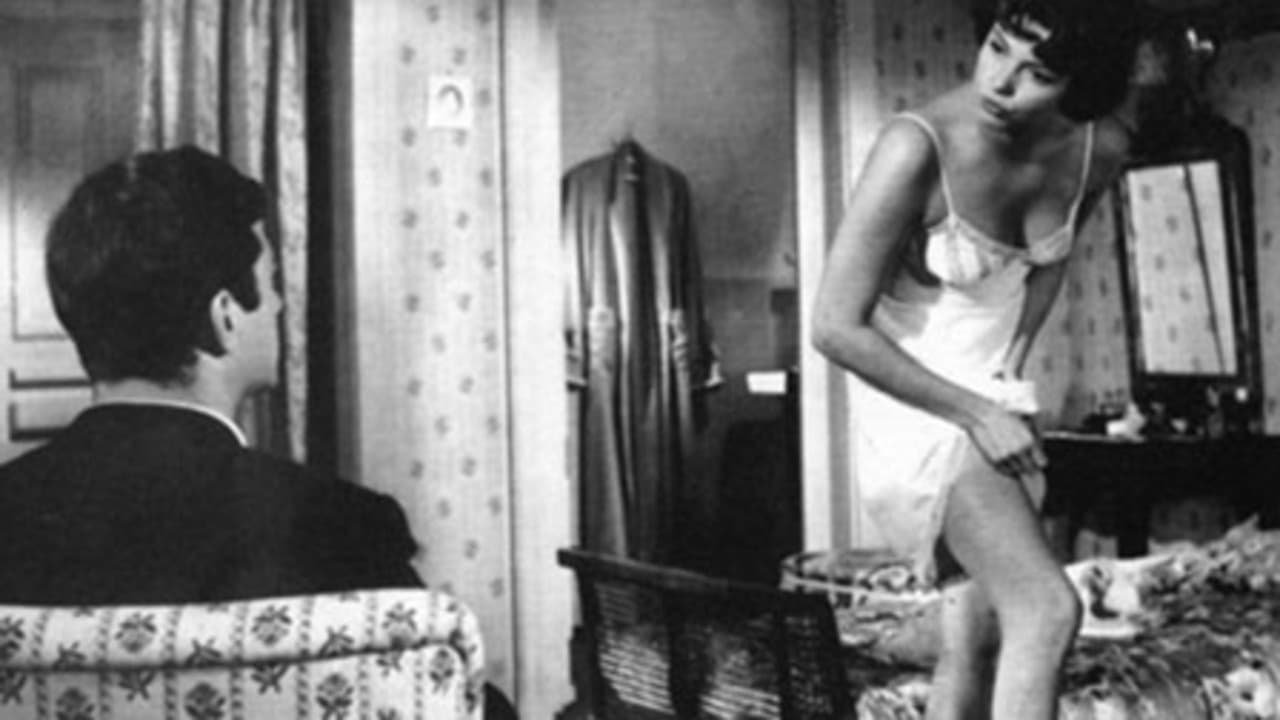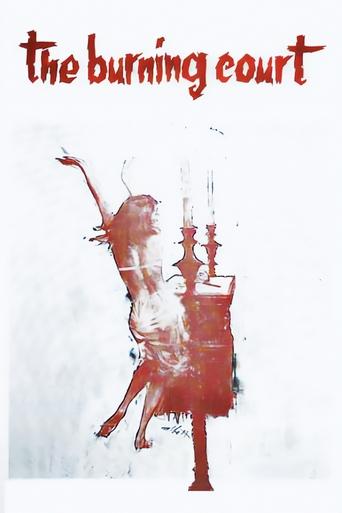Sexylocher
Masterful Movie
GetPapa
Far from Perfect, Far from Terrible
Intcatinfo
A Masterpiece!
Organnall
Too much about the plot just didn't add up, the writing was bad, some of the scenes were cringey and awkward,
morrison-dylan-fan
Taking a look at writer/directing auteur Julien Duvivier's IMDb page after recently re- watching his amazing Film Noir Chair De Poule,I was delighted to find out that Duvivier had directed a Horror title,which led to me excitingly getting ready to enter Duvivier's court.The plot-The 18th century:As a woman and her 2 brothers are burnt at the stake for allegedly being involved in witchcraft.The woman uses her dying breath to put a curse on the lover who betrayed her,with the woman telling the man,that he and all future generations related to him,will experience horrible,violent deaths.The present:Paying a visit to his uncles mansion with his brother Marc, Stéphane Desgrez is caught by surprise,when a historian called Michel Boissard is invited to the mansion,with Boissard revealing that he is visiting the mansion,due to its "cursed" history being something which would be a perfect fit for his magazine.Knowing that Marc and Stephane have come down to pay him a friendly visit solely to get back in his will,the uncle tells nurse Myra that he does not want to see either of them.Taking Boissard on a tour of the mansion, Stephane becomes agitated when Boissard begins to ask him about urban legends related to letters related to the curse,which are said to be hidden in the mansion,that causes Stephane to put his foot firmly down and state that the urban legends are complete rubbish. Quietly meeting his uncle,Marc is asked by his uncle to keep Stephane as far away from him as possible.After eating a huge meal,Marc, Stephane and their wives decide to leave their uncle at the mansion,and attend a party being held that night.Later that night:Entering the mansion,a maid goes to the kitchen to gather the uncles nightly medicine.Being unable to find the medicine,the maid decides to pay a visit to the uncles bedroom,where she is left completely speechless,when she sees the ghost of the curse woman giving the uncle some burning medicine.View on the film:Showing the mansions shadow to cover up any positive attributes that the characters may have,co-writer/ (along with John Dickson Carr and Charles Spaak)director Julien Duvivier builds an extraordinary atmosphere which mixes gritty Gothic Horror with harsh Film Noir,as Duvivier shows the light attempting to brighten up the mansion,to be unrelentingly stark,with the light revealing the real monsters that inhabit the place.Slowly allowing for a thick mist to appear on the mansions horizons, Duvivier and cinematographer Roger Fellous expertly use quick tracking shots to unleash a tense Supernatural Horror mood,which leads to the characters and the viewer being unsure if a stranger seen from a distance is part of their imagination, or if it's the urban legend coming to life.For the screenplay,the writers show a tremendous skill in increasing the Horror and Film Noir pressure as the characters gradually sink into darkness,thanks to Marc and Stéphane playful arguments being shown to contain an unforgiving sting.Along with Marc and Stephane's relationship,the writers smartly use the Gothic Horror route as a way to give the title a strong mystery edge,which leads to the movie striking with a wonderfully cynical final note.Entering the movie with a straight lace shine (and backed by an icy score from Georges Auric) ,the great Jean-Claude Brialy shows the perfection on Marc's face to crack into a 1000 pieces,as the horror related to the family curse,leads to horrors that Marc attempts to hide,to rise from the dead. Initially appearing to be rather playful,the terrific Claude Rich shows Stéphane face to turn to stone,as he discovers Marc's hidden horrors,and looks into the burning court.
MARIO GAUCI
Another "victim" of the French Nouvelle Vague - a distinguished film director who found himself unceremoniously falling out of fashion within critical circles - was undoubtedly Julien Duvivier. Admittedly, his best work was behind him by then in such classic films like PEPE LE MOKO' (1937), UN CARNET DE BAL (1937; one of Michael Caine's favorite films!) and PANIQUE (1947; a rumored upcoming Criterion DVD release) but, if this obscure but richly rewarding suspenser is any indication, his cinematic and narrative skills did not desert him with age.Apparently, the original source novel by John Dickson Carr is a celebrated (and much more sophisticated) literary piece but even if this film adaptation (by renowned screenwriter Charles Spaak) constitutes an oversimplification, one cannot deny the fact that it is highly polished entertainment nevertheless. The plot ingeniously combines two prolific subgenres in the horror film lexicon, "the old dark house" and "the witch's curse", dealing as it does with an 18th Century witch being deceived by her lover - a policeman dressed as a monk! - thereby unleashing a vengeful curse on his ancestors which decrees that every subsequent head of the family dies a violent death. This event is not depicted in the film but merely referred to throughout and we immediately jump into the present with a female ancestor of the witch - played by the beautiful Edith Scob from Georges Franju's EYES WITHOUT A FACE (1959), here with her hair bleached blonde - being invited with her novelist husband to a château in the country which, as it happens, is owned by the ancestors of the witch's duplicitous lover. The latter are a despicable bunch of amoral opportunists with the two young heirs greedily awaiting the demise of their cantankerous 75-year old uncle which could occur at any moment. One night, every member of the household (including his nurse) desert the old man for their own egotistical purposes and Scob and her husband volunteer to stay home and watch over him themselves... Apart from the illustrious trio in the behind-the-camera personnel (Duvivier, Spaak and music composer Georges Auric), the film boasts atmospheric lighting by Roger Fellous and a cast of willing performers: the afore-mentioned Scob, Jean-Claude Brialy (as the more level-headed of the two heirs), Claude Rich (as his worthless playboy brother), Nadja Tiller (as the lovely nurse who, ultimately, is not as loyal as she makes out to be), etc. There are elements of the supernatural (when the murderer is seen passing through the walls of a closed room by the housekeeper or when the body vanishes from the interred coffin and reappears sitting in a chair in the family chapel) and black comedy (when the mourners at the funeral waltz around the still open coffin at the deceased's own request) involved which only add to the fun. It would be a mistake to reveal more of the twists and turns the plot takes in the second half of the film - which also introduces the character of a no-nonsense police inspector - but I'll say only that it all ends rather too abruptly perhaps (immediately after the ironic final revelation) leaving the fate of some of the major characters pretty much unresolved.
dbdumonteil
The sixties were a very hard time for Julien Duvivier.He was despised,tried for academism by the burning court of the nouvelle vague. He did not realize that he was much more than them,and thus,he tried some new tricks,some coming from the "modern" artists:the baroque castle might evoke that of "l'année dernière à Marienbad",and he hired two young actors ,one Chabrol's favorite,Jean-Claude Brialy,the other George Franju's darling,Edith Scob,and he tried to imitate Godard's "driving scenes" in "à bout de soufflé".What's bred in the bone comes out in the flesh.Like Marcel Carné before him("les tricheurs"),Duvivier could not do "nouvelle vague" stuff,and anyway he's better at so many other things ,so why bother?John Dickson Carr,whose novels are extremely complicated, provided him with a very strong screenplay:the starting point is the authentic poisons affair,during the Sun King's reign;the marquise de Brinvilliers was one of the main convicts and she died on the scaffold,betrayed by a cop dressed up as a monk.In Brialy's and Claude Rich's uncle's desirable property,come an historian and his wife who is (believe it or not) a Brinvilliers's descendant.That's not all: the uncle is himself the cop Desgrez's descendant.And there's a curse,à la "hound of Baskerville" ,which has stroke every Desgrez since the marquise died. The uncle is a wealthy and ill old man whose death would be the welcome for his two nephews.It won't be long till it happens.Duvivier managed to sustain suspense throughout the whole movie,with excellent scenes :the bal,with the mourners waltzing to Strauss musicaround the coffin wide open;the foggy ,misty atmosphere of the park;the strange woman who seems to walk through a wall.But he did not succeed in linking the rational and the supernatural together.Edith Scob's character has no connection with the rest of the plot,and Dickson Carr's ending which allowed some doubt ,is turned to a complete "normal solution,in spite of the last words of the captain .Those were hard times for Duvivier.Actor Alain Delon told he was suffering from not getting the esteem he deserved anymore.It was the final straight :three more movies and he was to pass away five years later.Since he's been restored to favor,quite rightly so.NB:Desgrez ,a historic figure ,was also featured in the "Angelique Marquise Des Anges" saga ,with a dog called Sorbonne.
galensaysyes
When this movie came out, a publisher brought out a tie-in edition of the novel, with a nude dancer on the cover. For this reason I'd been looking forward to the movie; but it never appeared, and I'm only seeing it on video now. And it's okay: not worth waiting twenty years for, but okay. Its prefatory sequence promises a story about a family curse laid down by an ancestor who was burned as a witch. But there's no real curse and no real witch; this is just a red herring. The story isn't a horror story but a murder mystery with spooky overtones. As a mystery, it starts slowly but gains in interest as it goes. It's set in a French château, where a family gathers, officially to hold a ball, but in effect mainly as an excuse for squabbling. One of them turns up dead; the only witness to the crime swears to an event that seems impossible; presently the body presently vanishes. In the absence of a detective as the leading character, the script has no solid structure: it starts with one pair of characters and ends with another, the motives for the characters' actions, other than the murder, are obscure, and the surprise ending seems to belong to another movie. But the direction kept me intrigued most of the way, the black-and-white photography is attractive, and the actors are good enough, as far as can be judged from the dubbing (which is not bad, for dubbing). It's okay--not not-okay-okay, but really okay.Only, I'm still looking for that nude dancer from the paperback, because there are none in the movie. And no burning court, either.Oh, well.

